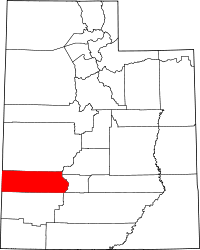Frisco, Utah
| Frisco, Utah | |
|---|---|
| Ghost town | |
|
Remains of Frisco. The charcoal kilns in the background are listed on the National Register of Historic Places. | |
 Frisco  Frisco Location of Frisco in Utah | |
| Coordinates: 38°27′35″N 113°15′32″W / 38.45972°N 113.25889°WCoordinates: 38°27′35″N 113°15′32″W / 38.45972°N 113.25889°W | |
| Country | United States |
| State | Utah |
| County | Beaver |
| Established | 1879 |
| Abandoned | 1929 |
| Named for | San Francisco Mountains |
| Elevation[1] | 6,421 ft (1,957 m) |
| GNIS feature ID | 1437563[1] |
Frisco is a ghost town[2] in Beaver County, Utah, USA.[2][3] It was an active mining camp from 1879 to 1929.[3] At its peak in 1885, Frisco was a thriving town of 6,000 people.[4]
History
Frisco developed as the post office and commercial center for the San Francisco Mining District, and was the terminus of the Utah Southern Railroad extension from Milford.[2][3] The Horn Silver Mine was discovered in 1875,[2][3] and had produced $20,267,078 worth of ore by 1910.[3] By 1885, over $60,000,000 worth of zinc, copper, lead, silver, and gold had been transported from Frisco from the many mines in the area.[2]
With 23 saloons, Frisco was known as the wildest town in the Great Basin. Murder was common, and drinking water had to be freighted in.[5]
Frisco's fortunes changed suddenly on February 13, 1885, when the Horn Silver Mine caved in completely. It was an unconventional mine, an open pit 900 feet (270 m) deep braced with timbers, and could have collapsed at any time.[6]
In 1905 a Latter Day Saint ward was organized, but in 1911, with the closing of many of the mines, so many church members had left that the ward was discontinued.[7] After many years of desertion, another company made an attempt to mine here in 2002.[2]
Geography
Frisco is located at 38°27′35″N 113°15′32″W / 38.45972°N 113.25889°W. Its elevation is 6,500 feet (2,000 m).[8]
Demographics
The peak population was nearly 6,000.[2]
| Year | Population |
|---|---|
| 1880 | 800[3] |
| 1900 | 500[2][3] |
| 1912 | 150[2][3] |
| 1918 | 300[3] |
| 1922–1923 | 100[3] |
| 1927–1928 | 100[3] |
See also
References
- 1 2 U.S. Geological Survey Geographic Names Information System: Frisco
- 1 2 3 4 5 6 7 8 9 "Frisco, Utah - Ghost town with a ten year high". legendsofamerica.com. April 2005. Retrieved 2007-08-26.
- 1 2 3 4 5 6 7 8 9 10 11 Notarianni, Philip F. "Frisco". Utah history encyclopedia. University of Utah. Retrieved 2007-08-26.
- ↑ "Frisco, Utah the Ghost Town". Friscoutah.com. Retrieved 2 August 2015.
- ↑ Carr, Stephen L. (1986) [June 1972]. The Historical Guide to Utah Ghost Towns (3rd ed.). Salt Lake City: Western Epics. pp. 110–111. ISBN 0-914740-30-X.
- ↑ Thompson, George A. (November 1982). Some Dreams Die: Utah's Ghost Towns and Lost Treasures. Salt Lake City: Dream Garden Press. pp. 128–129. ISBN 0-942688-01-5.
- ↑ Jenson, Andrew (1941). Encyclopedic History of The Church of Jesus Christ of Latter-day Saints. Salt Lake City: Deseret news Press. p. 270.
- ↑ Buchanan, Joseph F. (1996-06-06). "Utah Almanac D-H". Utah Almanac. Retrieved 2010-10-09.
External links
| Wikimedia Commons has media related to Frisco, Utah. |
- Photos by James Hammond
- History by Bob Bezzant and photos by Bob Bezzant and Dolores Steele
- Frisco Utah

